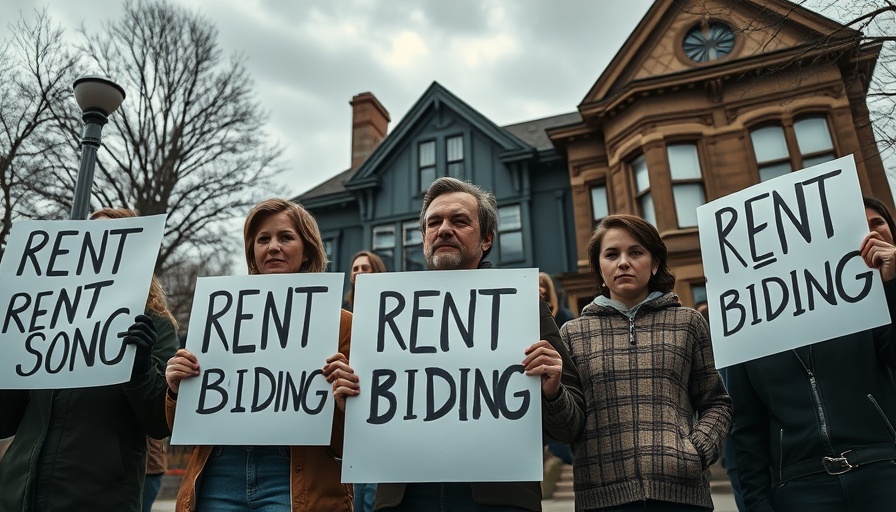
Victoria's New Rental Regulations: A Change in the Wind?
In a notable shift within Victoria's rental landscape, the government has announced that starting October 2025, it will be illegal for landlords or agents to encourage rent bidding, a practice that has long plagued tenants seeking affordable housing. This move, positioned as a means to safeguard tenants from escalating rental costs, raises essential questions about whether it genuinely addresses the deep-rooted issues within the market.
What Is Rent Bidding and Why Is It a Problem?
Rent bidding occurs when prospective tenants offer more than the listed rental price to secure a property, a practice that is often initiated by tenants in a highly competitive housing market. This phenomenon is exacerbated by the urgent need for renters to secure housing in an environment where vacancy rates hover around historic lows, often falling under 1% in many suburbs.
The Andrews and Allan governments portray rent bidding as an unfair tactic that incites competition among tenants, pushing rental prices beyond reasonable limits. Harriet Shing, Victoria's Housing Minister, emphasized that this ban is aimed at "leveling the playing field" and easing the stress renters face as they navigate such a competitive market. However, it is crucial to note that rent bidding is merely a symptom of a significantly larger issue: a chronic shortage of rental properties.
The Real Crisis: A Lack of Supply
While the ban on rent bidding might provide temporary relief from the financial stresses faced by renters, it does not address the underlying cause of the problem: the persistent shortage of rental properties. For years, the state has suffered from a scarcity of affordable housing, worsened by factors such as underbuilding, excessive regulations, and rising operational costs for landlords that push them out of the market.
Until these structural challenges are resolved, merely banning rent bidding could make the rental market more rigid, shifting the problem rather than solving it. As the state's rental vacancy rates remain perilously low, the attempts to stabilize the housing situation are likely to resemble a band-aid fix to a significant wound.
What Changes Can We Expect when the Ban Takes Effect?
Once the ban comes into effect, we may anticipate several potential market adjustments. For example, landlords might respond to the change by raising their asking rents significantly. If tenants can no longer outbid each other, landlords may simply increase their initial price to reflect what they believe tenants are willing to pay in the absence of bidding wars.
Furthermore, this could lead to a less transparent rental process. Without the option to compete over rent, tenants may find themselves vying less for the properties they desire, leading to a potential stagnation in the market.
The Broader Impacts on the Newcastle Property Market
This ban on rent bidding may not only impact Victoria's housing market but also serve as a critical indicator for surrounding areas like Newcastle. As the New South Wales (NSW) property market remains increasingly competitive with its own set of challenges, including rising house prices and limited supply, the Victoria ban could inspire similar discussions and strategies among Newcastle property stakeholders.
Newcastle's current rental environment, characterized by fluctuating house prices and an unusual demand for rental properties, could see ripple effects if tenants respond positively to the ban in Victoria. As we analyze Newcastle, one must consider the "Newcastle property market trends", emphasizing the urgent need for policies that extend beyond mere regulation and focus on developing additional housing stock.
Finding Balance in the Rental Market
While the intent behind the rent bidding ban in Victoria aims to protect tenants from undue financial stress, it is essential for policymakers to examine comprehensive solutions that foster a healthier rental market. This includes invigorating the supply chain for rental properties and examining how regulations impact both tenants and landlords alike.
In conclusion, the ban signals a legislative acknowledgment of the struggles faced by tenants, but without strategic planning and resource allocation, solving the underlying issues remains crucial for sustainable housing solutions.
Take Action!
If you’re interested in learning more about how rental policies impact your investments and living situation in Newcastle, stay informed. Real estate trends continually shape one of the most significant markets in our community. Explore the recent trends in "Newcastle real estate" and how they directly correlate with broader legislative changes across Australia.
 Add Row
Add Row  Add
Add 




 Add Row
Add Row  Add
Add 

Write A Comment